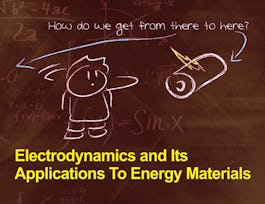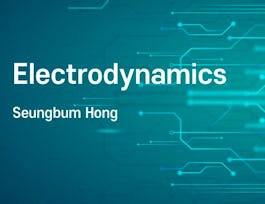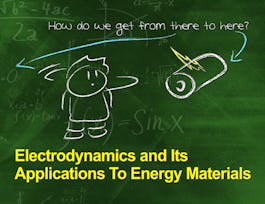This course is a continuation of Electrodynamics: An Introduction and Electrodynamics: Analysis of Electric Fields. Here, we will introduce magnetostatics and relate it to the material we learned previously. In addition, we will cover the basics of the electromotive force and how it can be used to build different devices.


Electrodynamics: Electric and Magnetic Fields
This course is part of Electrodynamics Specialization
Taught in English
Some content may not be translated

Instructor: Seungbum Hong
12,978 already enrolled
Included with 
Course
(221 reviews)
Details to know

Add to your LinkedIn profile
5 quizzes
Course
(221 reviews)
See how employees at top companies are mastering in-demand skills

Build your subject-matter expertise
- Learn new concepts from industry experts
- Gain a foundational understanding of a subject or tool
- Develop job-relevant skills with hands-on projects
- Earn a shareable career certificate


Earn a career certificate
Add this credential to your LinkedIn profile, resume, or CV
Share it on social media and in your performance review

There are 5 modules in this course
This module covers the how electrodynamic solutions can be used to find solutions applicable to other fields. We describe how electrodynamics is comparable to heat transfer, membrane physics, neutron diffusion, and other natural phenomenon. Through these comparisons, understanding of other physics can be realized.
What's included
3 videos2 readings1 quiz
This module introduces magnetostatics, and the magnetic field outside of different geometries, and how relativity can be used to understand magnetic forces. To lead into this, we will describe how to characterize current in a wire and while doing this, attention will again be drawn to the similarities between electrostatics and magnetostatics
What's included
2 videos1 reading1 quiz
This lecture introduces the concept of the magnetic vector potential, which is analogous to the electric potential. We explain the distribution of the magnetic potential and how to use it when solving for the electric field. The magnetic dipole is also introduced and the Biot-Savart law is described.
What's included
2 videos1 reading1 quiz
In the first part of this module, we explore the topic of energy and work in the context of electrodynamics. Then we explain the usefulness of the magnetic vector potential (A) and why it is a real field. Finally, we tie these concepts with quantum mechanical electrodynamics, and reveal equations that are useful beyond the scope of statics.
What's included
2 videos1 reading1 quiz
In the final module, we mostly cover the electromotive force, induced currents, and how they may be applied to create devices. We show how forces, electric currents, and magnetism all interact in order to operate machinery.
What's included
3 videos1 reading1 quiz
Instructor

Recommended if you're interested in Electrical Engineering

Korea Advanced Institute of Science and Technology(KAIST)

Korea Advanced Institute of Science and Technology(KAIST)

Coursera Project Network

Korea Advanced Institute of Science and Technology(KAIST)
Why people choose Coursera for their career




Learner reviews
Showing 3 of 221
221 reviews
- 5 stars
85.97%
- 4 stars
11.76%
- 3 stars
1.80%
- 2 stars
0%
- 1 star
0.45%

Open new doors with Coursera Plus
Unlimited access to 7,000+ world-class courses, hands-on projects, and job-ready certificate programs - all included in your subscription
Advance your career with an online degree
Earn a degree from world-class universities - 100% online
Join over 3,400 global companies that choose Coursera for Business
Upskill your employees to excel in the digital economy
Frequently asked questions
Access to lectures and assignments depends on your type of enrollment. If you take a course in audit mode, you will be able to see most course materials for free. To access graded assignments and to earn a Certificate, you will need to purchase the Certificate experience, during or after your audit. If you don't see the audit option:
The course may not offer an audit option. You can try a Free Trial instead, or apply for Financial Aid.
The course may offer 'Full Course, No Certificate' instead. This option lets you see all course materials, submit required assessments, and get a final grade. This also means that you will not be able to purchase a Certificate experience.
When you enroll in the course, you get access to all of the courses in the Specialization, and you earn a certificate when you complete the work. Your electronic Certificate will be added to your Accomplishments page - from there, you can print your Certificate or add it to your LinkedIn profile. If you only want to read and view the course content, you can audit the course for free.
If you subscribed, you get a 7-day free trial during which you can cancel at no penalty. After that, we don’t give refunds, but you can cancel your subscription at any time. See our full refund policy.

